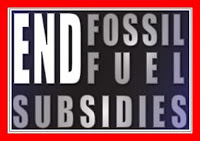It is estimated that removing fossil fuel subsidies would reduce greenhouse gas emission by 10 per cent by 2050.
As reported in the New Yorker, the International Monetary Fund (IMF) said that there are $5.3 trillion worth of fossil fuel subsidies in 2015 or six and a half percent of global G.D.P.. This breaks down to $10 million a minute or more than the entire health spending of all the world’s governments.
According to Reuters fossil fuel subsidies exceed climate aid by a ratio of 40 to 1.
Jake Schmidt, of the Natural Resources Defense Council, said: "Given tight budget times and the need to address global warming, subsidising activities that are heating the planet just doesn't make sense. The only beneficiaries of fossil fuel subsidies are oil, gas and coal companies that are raking in record profits at the expense of the rest of us."
Prince Charles said the governments must end fossil fuel subsidies. Realizing the dream of ending fossil fuel subsidies was brought one step closer at the recent COP21 climate meetings in Paris.
Almost 40 countries have endorsed the Fossil Fuel Subsidy Reform Communiqué, including: Canada, Chile, France, Germany, Italy, Malaysia, Mexico, Morocco, Peru, the Netherlands, the Philippines, Samoa, the U.S., Uganda and Uruguay.
According to the UNFCCC statement: “An unprecedented coalition of close to 40 governments, hundreds of businesses and influential international organisations has called today for accelerated action to phase out fossil fuel subsidies, a move that would help bridge the gap to keep global temperature rise below 2°C.”
John Key, the New Zealand Prime Minister, presented the Fossil Fuel Subsidy Reform Communiqué at the Paris Conference said: “Fossil fuel subsidy reform is the missing piece of the climate change puzzle. It’s estimated that more than a third of global carbon emissions, between 1980 and 2010, were driven by fossil fuel subsidies...Their elimination would represent one seventh of the effort needed to achieve our target of ensuring global temperatures do not rise by more than 2°C. As with any subsidy reform, change will take courage and strong political will, but with oil prices at record lows and the global focus on a low carbon future—the timing for this reform has never been better.”
Christiana Figueres, executive secretary of the UN Framework Convention on Climate Change (UNFCCC) said in accepting the Communiqué: “These subsidies contribute to the inefficient use of fossil fuels, undermine the development of energy efficient technologies, act as a drag on clean, green energy deployment and in many developing countries do little to assist the poorest of the poor in the first place.
Some wrongly argue that fossil fuel subsidies help the poorest members of society. According to the IEA said. Just 8 percent of aid reached the poorest 20 percent of each country’s population last year. Most of the benefits—85% to 90%—typically accrue to those on middle incomes and the wealthy
Hakima El Haite, Environment Minister of Morocco, candidate for the presidency of COP22, said: “Not only do fossil fuel subsidies put a strain on government coffers but they also don’t help the poorest of society.”
In 2011 President Obama's attempts to eliminate $4 billion in oil and gas subsidies from the U.S. budget was denied by Congress. However in the US and around the world pressure is growing to definitively end subsidies that are wrecking the climate and imperiling life on earth.
Here is an infographic that does a good job of visually illustrating the issue of fossil fuel subsidies:

Related
Fossil Fuel Subsidies and Renewable Energy Post COP21
Time to Reduce the Subsidy Gap Between Fossil Fuels and Renewable Energy
Infographic - Fossil Fuel Subsidies
Curbing Fossil Fuels - Carbon Pricing and an End to Subsidies (WEF Summaries)
Infographic - Climate Finance vs Fossil Fuel Subsidies: National Comparisons
Infographic - Fossil Fuel Subsidies and the US Congress
Problems and Solutions to the Climate Crisis from the World Economic Forum in Davos
A Large and Growing Chorus is Calling for an End to Fossil Fuel Subsidies
Scientists Urge Government Action on Climate Including Removing Oil Subsidies
Fossil Fuels are the Most Hated Industry in the US
End Fossil Fuel Subsidies Totaling One Trillion Per Year
Rio+20: 350.org Campaign to End Fossil Fuel Subsidies
Obama Striving to Put an End to Oil Subsidies
GOP Fights Removal of Oil Subsidies
End Fossil Fuel Subsidies
Obama's Call for an End to Oil Subsidies






0 comments:
Post a Comment